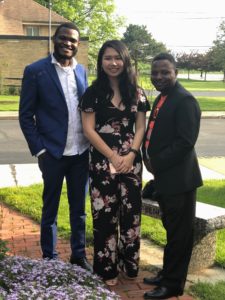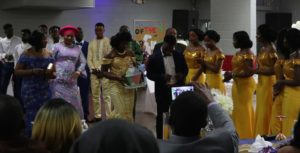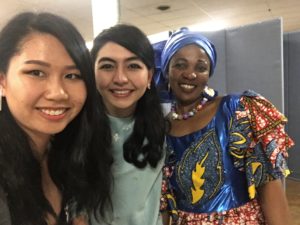A Malaysian walks into a traditional Congolese wedding in Cleveland…
…no it’s not the beginning of a joke. This is my experience at my first African wedding.
By Samantha Chow
When I left Malaysia for the States for a six-week professional fellowship with Global Cleveland, I anticipated experiencing different cultures and meeting new people. After all, Cleveland is home to a diverse population including refugees and immigrants of various nationalities. However, never did I once imagined I’d be able to witness a traditional African wedding.
I was first introduced to Crispin as part of my fellowship experience to learn his life story as a refugee from Congo. He has eight children, and all of them except one daughter live in a house with him and his wife. Yes – it’s a family of 10! We spoke about his family, how he escaped to Rwanda as a refugee and his life in the United States.
The biggest challenges for them as refugees in the US, said Crispin, are the language barrier, cultural differences, and the lack of familiarity with American laws. Luckily, his family is settling in well due to the strong community support in Cleveland. Crispin also founded a church in 2017, called the Shekinah Apostolic Ministries International. “It means ‘tangible glory of God’ in Hebrew,” he explained. Before we left the coffee shop, Crispin kindly invited me and a guest to his daughter’s traditional wedding that weekend.
A traditional African wedding in Cleveland, Ohio? It would be crazy for me to pass up such an opportunity, so I very gratefully accepted and invited my housemate Farah as my guest.
Traditional African wedding ceremonies will see the exchange of dowries and are culturally symbolic to mark the union of the two families. Both the bride and groom knew each other from the church where Crispin is a pastor, and their friends and guests such as myself are also invited to cheer them on. The traditional wedding ceremony is not formal and the couple isn’t expected to live as husband and wife together yet. In this couple’s case, they have planned the formal church wedding ceremony for next year.
It’s slightly different from Malaysian Chinese culture, where we would hold the “traditional” wedding ceremony as the actual formal ceremony or a symbolic “tea presentation” to the elders of the family — all which would usually be on the same day.
Farah and I arrived at the venue, a church hall, in anticipation of the evening. The tables and chairs were decked in blue and gold, and the groom’s family wore beautiful gowns and suits of blue. It was a lovely, warm spring evening as families and friends greeted each other. I received a few curious looks which quickly turned into friendly smiles and even a few requests for photos!

As the sole Malaysian at the wedding, I received a few inquiries about my country and some requests for photos.
The evening started off with music and greetings from the two emcees, who spoke English and Swahili. A traditional African wedding ceremony is known as a “dot”, where they exchange dowries and get to know each other’s families better. The emcees invited a representative from each side of the family up to the front, where they began sharing about their families.
As upbeat music started playing, all heads turned to the back of the room. The groom’s younger family members danced into the room while holding gifts such as woven baskets, rice, and cooking oil. It was an entire process, and everyone knew their roles. They handed some gifts over to the bride’s aunt, and it was a moment of anticipation as she took them to her table and inspected them one by one. The crowd loudly cheered every time she returned and deemed the gifts good enough to be accepted.

The dowry ceremony is a success, and the bride’s father gives his blessings to the couple, who take an embrace.
My new friends at my table were kind enough to translate, as the English-speaking emcee could not manage to explain everything that was happening. Even so, I wished I could understand everything that was said because there was just so much happy banter throughout the night.
“I’ve brought my ‘cow’, now you bring yours,” an uncle jokingly said to his new family member, as the crowd exploded in laughter. According to my new friend sitting to my right, there were many cow-related jokes made that night. It was all in good fun, and the guests made Farah and I feel so welcomed as they introduced themselves and asked questions about our countries and cultures.
The ceremony came to an end after more than two hours, and a delectable buffet including jollof rice, lamb, and tapioca leaves was served. When we finally left for home, it was on a high note. It’s always an amazing experience to make new friends and witness a new culture, and we are glad it was with Crispin and his beautiful friends and family.

Me, Farah and the chef who helped prepare the excellent buffet spread for the wedding.

